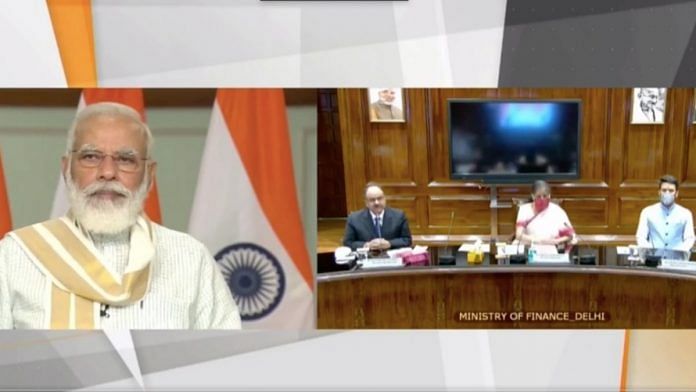
New Delhi: The Income Tax Department will have to treat the taxpayer with dignity and sensitivity, Prime Minister Narendra Modi said Thursday as he virtually launched a new taxpayer charter, and the facilities of faceless assessment and appeal for all taxpayers.
The new set of reforms is part of the government’s efforts to honour “honest” taxpayers, Modi said, adding that the attempt is to make the tax system “seamless, faceless and painless”.
While the new charter and faceless assessment are effective immediately, the faceless appeal facility will be launched in September, said Modi.
A taxpayer charter assures taxpayers of their rights while reminding them of their duty of paying tax timely and fairly.
Under faceless assessment, the scrutiny of returns of a taxpayer will be done by a tax officer selected at random and not necessarily from the same jurisdiction. This will do away the need for any face-to-face contact between the taxpayer and tax official, thereby reducing the chances of coercion and rent-seeking.
A faceless appeal system will also allow the taxpayer to appeal against a tax official’s decision without the need of making a physical representation.
Also read: Taxes without borders: Govt revises tax on digital transactions, but ambiguities remain
What the charter says
Finance Minister Nirmala Sitharaman had first mentioned the government’s intent to introduce a taxpayer’s charter in her February 2020 budget speech.
The charter says the I-T Department will have to treat every taxpayer as honest unless evidence proves otherwise. Taxpayers will have to be given fair, courteous and reasonable treatment, and their privacy respected. The tax department should stick to prescribed timelines in the income tax law and collect only the correct amount of taxes.
On their part, the taxpayers will have to be honest and compliant and pay their taxes on time while maintaining accurate records.
Faceless assessment
Modi said that faceless assessment is a “big step in reducing government interference from people’s lives”. He also pointed out that the I-T department has been progressively reducing the percentage of cases it picks for scrutiny.
In 2018-19, 0.26 per cent of the total tax returns were picked up for scrutiny as against 0.94 per cent in 2012-13.
Besides eliminating face to face contact, faceless assessment is also expected to ensure speedy completion of cases.
Modi said that the tax system was a legacy from the British-era with very little changes made in nearly seven decades. This system crushed honest taxpayers, and businesses who were big employers, he said advocating the need for fundamental and structural reforms.
The Modi government, though, is yet to implement sweeping changes to the Income Tax Act through the proposed direct taxes code. The report of an expert group, presented last year on the overhaul of the Act, has neither been made public or implemented in totality.
Too few tax-paying citizens
During the tax reforms launch, Modi said the number of people who file returns has increased by 2.5 crore in the last six-seven years, but the total number of people paying taxes still remains very low.
“In a nation of 130 crore people, only 1.5 crore people pay taxes. This is very less,” Modi said, reminding the citizens of their duty to pay taxes correctly and on time.
Also read: I&B ministry could launch new magazine on 15 Aug but future of its Employment News uncertain

I’m glad Modi is returning to his reform oriented policies. I hope he moves on from Ayodhya (it’s kind of a full circle, he was launched into public consciousness because of Godhra and the riots). We really need to understand the urgency of building our economy rapidly and simply screaming Hindutva will keep us poor and defenceless (look at China, CPEC)